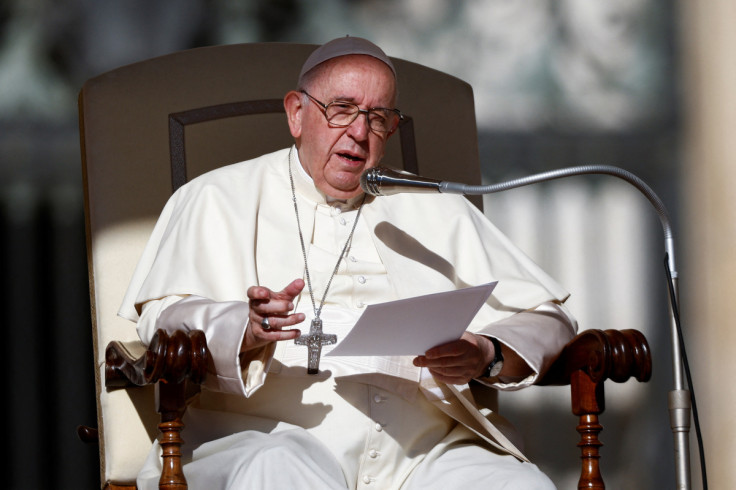How Long Has Pope Francis Been Pope: His Surprising Net Worth, Love For Wine, Football and More

Pope Francis, born Jorge Mario Bergoglio, has been the leader of the Catholic Church since 2013, becoming the first-ever Jesuit pope, the first from the Americas, and the first from outside Europe in over a millennium. As head of the Vatican, he maintains no personal wealth, living under the vow of poverty, yet he oversees an institution with significant financial resources.
How Much Is Pope Francis Worth?
Despite his powerful position, Pope Francis' personal net worth is estimated to be only £78 ($100), according to Celebrity Net Worth. Unlike high-ranking officials in other institutions, the pope does not receive a salary. Vatican cardinals, however, are reported to earn monthly stipends ranging between £3,700 and £4,650 ($4,700-$5,900).
Early Life and Path to Priesthood
Born in Buenos Aires on 17 December 1936, Jorge Mario Bergoglio was the eldest of five children in an Italian-Argentine family. His father, Mario, was an accountant who emigrated from Italy. Before joining the seminary, Bergoglio earned a diploma as a chemical technician and briefly worked in the food industry. His early years were also marked by stints as a bar bouncer and janitor, per reports from MSNBC.
Following a near-fatal illness that led to the removal of part of his lung, Bergoglio felt a stronger calling to serve the Church. In 1958, he joined the Society of Jesus, officially becoming a Jesuit, and later earned a philosophy licentiate. Over the years, he taught literature and psychology before completing his theological studies and being ordained a priest in 1969.
Rise Through the Church Ranks
Bergoglio rapidly ascended through the Church hierarchy, serving as Argentina's Jesuit provincial superior from 1973 to 1979. He was later named Auxiliary Bishop of Buenos Aires in 1992, then Archbishop in 1998. His reputation for humility and commitment to social justice was cemented during Argentina's 2001 economic crisis when he prioritised helping the poor.
In 2001, he was appointed cardinal by Pope John Paul II. Following Pope Benedict XVI's resignation in February 2013, Bergoglio was elected as his successor in March, taking the name Francis in honour of St. Francis of Assisi. According to The Catholic Telegraph, he chose this name due to his admiration for the saint's devotion to the poor and commitment to peace.
Papal Tenure and Key Policies
Since taking office, Pope Francis has taken a less formal approach to leadership, refusing to live in the luxurious Apostolic Palace, instead residing in Casa Santa Marta, the Vatican guesthouse. His tenure has been marked by a push for social justice, economic reforms, environmental advocacy, and interfaith dialogue.
He has advocated for a more welcoming stance towards LGBTQ+ individuals, a greater role for women in the Church, and has strongly opposed unregulated free-market capitalism, as reported by San Diego University.
On the diplomatic front, he played a pivotal role in restoring relations between the US and Cuba and has continuously urged nations to act on climate change. His encyclical, Laudato Si', calls for global action on environmental issues.
A Pope With Personality: Wine, Football, and No TV
Beyond his religious duties, Pope Francis is known for his love of wine, a passion inherited from his grandfather, a winemaker in Italy. He often references the biblical story of Jesus turning water into wine in his homilies. According to MSNBC, the Pope also enjoys espresso and Argentinian tea (mate).
In addition to his well-known love for football, he is an ardent supporter of San Lorenzo, one of Argentina's most famous football clubs. Interestingly, he hasn't watched television since 1990, a decision he made to maintain focus on his faith.
Health Concerns and Recent Condition
Pope Francis had a 'peaceful' night following what the Vatican described as a 'critical' health situation. According to BBC News, he has been suffering from a prolonged asthma-like respiratory crisis and has received blood transfusions to address a low platelet count due to anaemia. The 88-year-old is currently being treated for pneumonia in both lungs at Gemelli Hospital in Rome.
The Vatican stated that while the Pope remains 'alert' and spent much of the day in an armchair, he is relying on a high flow of oxygen, and his condition 'remains guarded.'
Doctors have acknowledged his delicate balance of health, noting that even the slightest change in circumstances could cause complications. The pontiff was first admitted to the hospital on 14 February after experiencing breathing difficulties for several days. His history of lung infections dates back to early adulthood when he suffered from pleurisy, which led to the removal of part of one lung at age 21.
As he undergoes treatment, the Pope has continued his religious observances, reportedly praying in the hospital chapel and reading from his chair. However, for the second consecutive Sunday, he will not lead public prayers, per Vatican officials. Well-wishers have gathered outside Gemelli Hospital and St. Peter's Basilica, leaving candles, flowers, and messages of support.
© Copyright IBTimes 2025. All rights reserved.





















